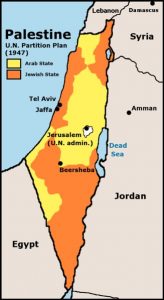Refused Refuge: Britain and Jewish Immigration in the 1930s & 1940s
Leah Jamieson
6.00-7.00pm, Main Hall, University College Isle of Man (free admission, no booking required)
The growing crisis for European Jews did little to alleviate immigration constraints adopted by many nation-states in the 1930s, including Great Britain. Immigration quotas were hardened in response to rising international and domestic considerations, namely economic depression and the prospect of war. Focus instead turned to safeguarding British interests, prioritising domestic matters over all others: no exception was made for the escalating persecution of the European Jewry.
For Britain, such restrictions were extended to their Mandate in Palestine, a prime destination for many prospective immigrants. The Jewish community was well established in Palestine with immigration remaining central to the Zionist aim of creating a Jewish state in the ‘Promised Land’. Palestine therefore came to represent a potential safe-haven for Jews, but this territory, too, became subject to immigration quotas, not least due to mounting Arab-Jewish hostilities. European Jews therefore found themselves with limited options for refuge.
Throughout the Second World War, the Allied victory took precedence. Thus, for those Jews still able to, potential escape routes remained limited. Those who were successful were often refused entry to safer lands and deportation to their respective countries of persecution was common. Strict border controls therefore helped to seal the fate of many Jews when, in 1942, the ‘Final Solution’ was implemented. By the time the truth about the Holocaust was realised, winning the war was the only feasible option to liberate those trapped in Europe: the pre-war opportunity to offer security had long since passed.
Following the Allied defeat of the Axis powers, Jewish immigration dominated the displaced persons crisis for war-ravaged Britain, primarily within Palestine. America as a new world superpower exerted pressure to allow mass immigration to Palestine, contradicting Britain’s promise in 1939 to prolong restrictions in the absence of Arab consent. Rising numbers of illegal immigrants into Palestine further weakened Britain’s influence whilst domestically, the British population turned against the Mandate following an increase in terrorism and a resultant loss of British life. These pressures alongside Britain’s depleting world status ensured the end of the Mandate, paving the way for the declaration of the State of Israel in 1948.
Whilst highlighting the precedence given to British interests, the study demonstrates the subordination of humanitarian considerations: allowing mass immigration at a time of economic and political instability was not considered viable in either Britain or Palestine. Moreover, when considering Britain’s stance on immigration within the context of the 1930s and 1940s, one is able to perceive a disposition which continues to manifest itself today: the question of obligation and responsibility of nations to accept refugees and the unwillingness of many to do so.
Back to the 2017-18 Lecture Series.
